In Kenya’s poorest region, going to school requires great sacrifices, but David Edapal is convinced that education guarantees his daughter a good future.
There is a rustle of dry twigs as goats try to make their way out of their pen through narrow openings. 12-year-old Rebecca Atubo carefully guides baby goats into their own cage before letting the adult goats loose. Soon, the goats are ambling towards pastures in the gentle early-morning sun.
In a few hours, the temperature rises and turns to relentless heat, and it is hard to find shade in the desert-like environment.
”Herding is hard work when it’s so hot, and you’re thirsty all the time,” Rebecca describes.
Still, Rebecca is obedient and does what is asked of her.
For thousands of years, the nomadic people of Northwest Kenya have made their living raising cattle, and children have taken responsibility for the family’s goats and cows at a young age.
However, the distance to pastures has grown longer. There is no green in sight in the yellowish-gray landscape outside the family’s huts. Rebecca’s father David Edapal has been worried for a long time. He cannot say how old he is, but the lines on his face reveal he has seen several decades in Turkana, the poorest county in Kenya.
”The weather has grown warmer, and there are much fewer rains than before. In order to get water, we have to walk for two hours one way every day to get to the nearest river,” says Edapal.
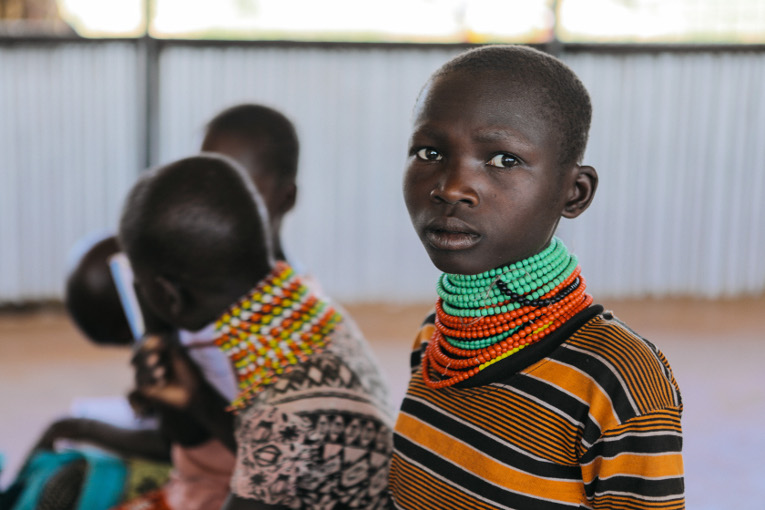
Rebecca says she prefers school to herding. Because of the heat, herding is hard work for both children and adults, and according to Rebecca, the thirst is the worst part.
Tested by drought
Severe periods of drought are testing Turkana more and more frequently. The drought in 2017 was the worst in decades. Hundreds of thousands of animals died due to lack of water as well as diseases.
This was a hard blow for the pastoralists, who traditionally move to follow the rains. Livestock are like a bank account on legs – they are used to fulfil all needs. Livestock provide milk and meat for food. Selling livestock brings in money to pay for things such as healthcare.
In addition, men need livestock to pay dowry to the family of the bride when they get married. The death of livestock hit families like an economic recession.
”Animals ravaged by drought cannot be sold or eaten, and they provide much less milk,” Edapal explains.
The crisis also fuels tensions among pastoralist people. They compete for the shrinking pastures, and extreme poverty makes stealing cattle a tempting prospect. A camel shepherd passing by carries an assault rifle on his shoulder to keep thieves at bay. Adding to the insecurity is a stream of firearms coming to Turkana across the border from neighbouring war-torn South Sudan.
For a pastoralist, questions about property are about as personal as asking a Finn about their salary. Most keep the number of livestock to themselves. However, Edapal reveals that cattle thieves took about two hundred of the family’s animals.
The family fled the insecurity into their current place of residence in the village of Ageles near the town of Lokichar. Edapal’s wife Aseken Namasi says all their hardships hurt her heart.
”The worst moment was when thieves killed four of my friends in front of my eyes when I was retrieving water,” she says. ”You can always get more livestock, but you can never replace a human being.”
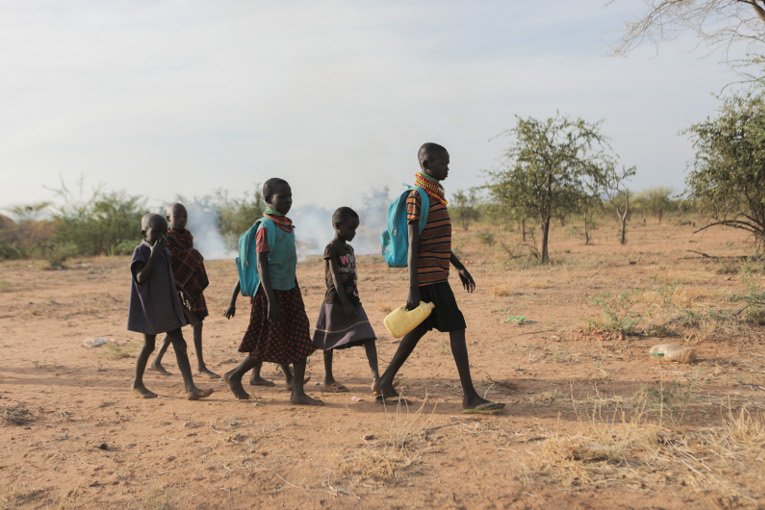
Rebecca Atubo, 12, (in front) walking to school with her friends. It is important to have the school close to home, as the journey to school is filled with danger in Turkana.
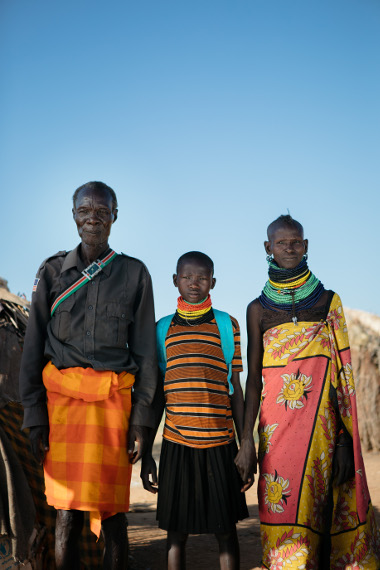
12-year-old Rebecca Atubo’s (middle) parents David Edapal (left) and Aseken Namasi sent their daughter to school. The shift from nomadic culture to a view of life that values education is seen strong in Turkana.
Almost all inhabitants of Turkana are pastoralists. Boys are brought up to raise cattle, and girls are expected to add to the family’s wealth by marrying. The dowry goes to the entire extended family.
Child marriage is still common. Because of the expectations of the traditional lifestyle, pastoralist people used to have little respect for education.
When Alice Loro Lele got to school age, her mother wanted her to go to school, but her father resisted. In anger, her father threw them both out, and with no livestock, they were destitute.
After comprehensive education, Alice could not afford to go to high school. Today, Alice is a 20-year-old mother of three, and lives in a hut in Lokichar with her mother.
”I married at 15, because I thought my husband would take care of us. I was foolish, and I didn’t know much about anything,” Alice says, clearly upset.
Her husband never paid dowry, which is another example of the plight of the nomadic people. As a gifted student, Alice got a job as a preschool teacher. She also started a general store. But her husband kept all the profits and started drinking. Alice gave birth to two children, but her husband did not care about them.
”When I was pregnant for the third time, my husband was going to get a second wife. I left him and moved back in with my mother,” Alice says.
Turkana lives under the poverty line
Places like Turkana are far from the reality of the capital Nairobi. Kenyan economy has grown at a rapid pace. Nairobi is teeming with skyscrapers, technology, and innovative mobile phone applications. In Turkana, most people live in villages with no electricity or running water.
In Nairobi, 22 percent of the people live under the poverty line, while in Turkana, the number is 88 percent. The disparity is largely due to education. In Nairobi, almost everyone has at least completed comprehensive school – in Turkana, 18 percent.
Pastoralists are moving into towns of Turkana with hope of work, but few of them even know how to read.
”We encourage families to send their children to school. More and more people see this as a solution in the long term,” says FCA education coordinator Miriam Atonia.
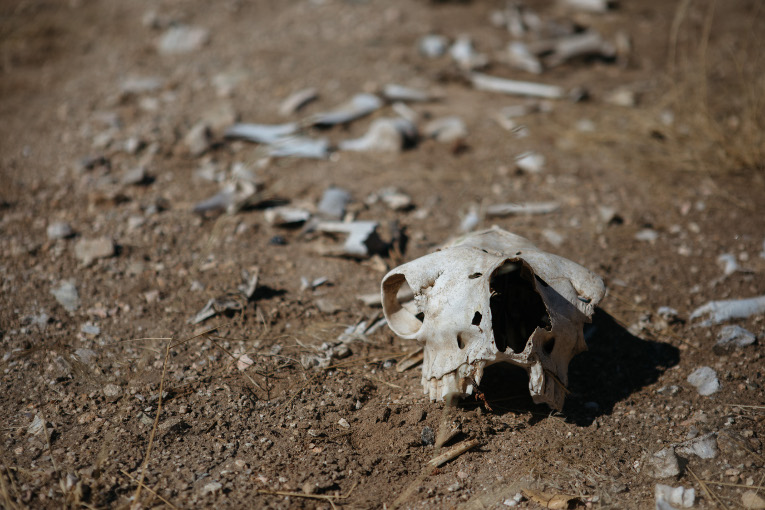
Hundreds of thousands of animals died during the drought of 2017. The drought had catastrophic repercussions for the nomadic people whose livelihood depends on raising cattle.
Things are moving in the right direction. Today, over half of the school-aged children and young people in Turkana go to school. Almost 27,000 started school in the poorest counties in Kenya in FCA projects during 2018.
Alice was offered a scholarship to study at a high school in Lokichar. She also thanks her mother for her support: mother looks after Alice’s children while she is at school.
”My heart breaks because I see my children so rarely. But we have to make some sacrifices; if we’re idle, we can’t improve our situation,” she says.
”I want to become a teacher because I want to encourage girls to go to school. I can give them the kind of advice I needed myself.”
It is hard to communicate the benefits of education to parents who have led a nomadic life. Edapal and Namasi did not go to school, but after a great deal of consideration, they decided to send their daughter Rebecca off to get an education.
”I have seen how the people of my generation, those who went to school, are succeeding. If we had received an education, we would be sleeping on mattresses, and our hut would have a tin roof instead of cloth,” he muses.
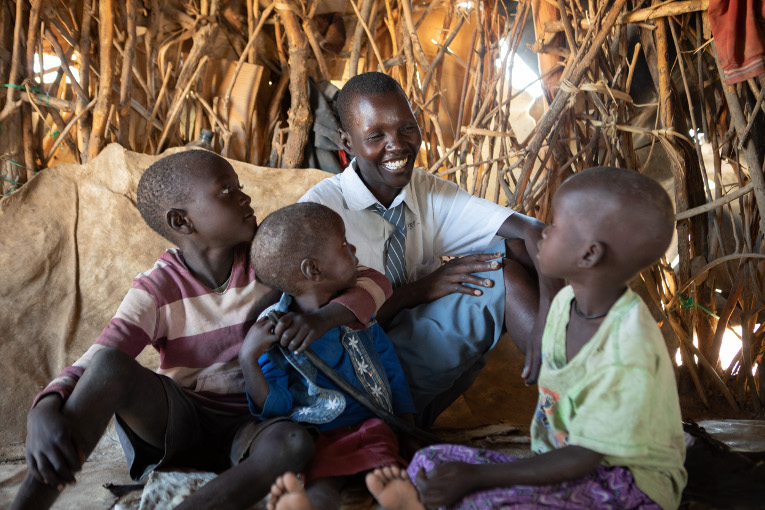
Alice Loro Lele (left) goes to school and takes care of her three children. She happy, that she decided to return to school.
A woman with an education is independent
After letting the goats out to pasture, it only takes Rebecca a few minutes of walking to get to the first lesson of the day. Edapal compares education to marriage – Rebecca is now married to school. An educated woman does not need to depend on others. She can make her own decisions regarding marriage once she is has finished her schooling.
Edapal feels proud when after her school day, Rebecca tells him about what she has learned.
”I hope Rebecca finds herself a job she likes, and God willing, can even help her parents in the future. Education provides lots of opportunities which I can’t even imagine.”
Text: Erik Nyström, Translation: Elina Vuolteenaho, Photos: Tatu Blomqvist / Ville Nykänen
Take part in the Common Responsibility Campaign at yhteisvastuu.fi, In addition, see the touching TV documentaries on the Yle channels starting from the beginning of February.
With EU humanitarian funds amounting to €700 000, FCA will rehabilitate schools, provide school supplies and train teachers in Baidoa, a hub for internally displaced people in Somalia.
This ‘education in emergencies’ intervention will address the lack of education for children of displaced families, but also of vulnerable host communities in Baidoa. Some 250 kilometres west of the capital Mogadishu, Baidoa has around 190 000 inhabitants and is a major hub for internally displaced people in Somalia’s Bay region.
Combined effects of droughts and other ongoing crises have damaged Baidoa’s economy. Not only are people’s livelihoods opportunities limited, a large number of children do not have access to quality education. There are only 14 public schools and no separate schools for primary and secondary levels.
“Years of devastating conflict and drought have led to mass displacement, interrupting the lives of ordinary Somalis and preventing children from going to school. The EU is committed to supporting education for children caught in crisis and giving displaced children the chances in life they deserve,” said Johan Heffinck, Somalia Head of Office for EU Civil Protection and Humanitarian Aid.
An assessment revealed that a lack of classrooms and safe learning spaces in addition to limited awareness and information have contributed to this education deficit. The community has previously not considered education its first priority and few parents can afford the tuition fees. Classrooms have not been renovated for over 30 years and are missing furniture and supplies. The camps for displaced people lack learning facilities.
With EU humanitarian support, FCA will rehabilitate ten classrooms in four schools and construct gender-sensitive water and sanitation facilities. The organisation will provide training for 50 teachers in pedagogy, school curricula while strengthening the capacity of community education committees to ensure quality education.
FCA has garnered considerable experience in running education projects globally and particularly in Eastern Africa. FCA aims to improve access to inclusive education, teaching and learning by building teacher capacity.
Finn Church Aid (FCA) has granted 30,000 euros to emergency assistance in Sierra Leone after mudslides and floods killed over 400 people in the capital Freetown and left more than 3 000 homeless.
Severe mudslides and floods hit Sierra Leone’s capital Freetown and it’s neighboring areas on Monday August 14th, killing at least 400 people. Razed buildings covered in mud and rubble left over 3 000 homeless.
“FCA will assist with building temporary shelter and providing food and clothing”, says FCA’s Country Director Michael Doe from Freetown.
The people who lost their homes need food, clothing, emergency shelter, blankets and basic kitchen utensils as well as health services. The death toll is expected to rise, as hundreds of people are still missing.
“The rain has stopped for now, and the data collection on surviving residents in the mudslide community continues. Surviving residents around the mudslide community have been asked to vacate the area, but it remains unclear where. A burial of over 300 bodies takes place in rural Freetown on Thursday”, reports Doe.
FCA’s Country Office cooperates with other ACT Alliance members.
More on FCA’s work in Sierra Leone
Seven years ago an earthquake destroyed homes and schools in Haiti. It was the starting point of Finn Church Aid’s largest humanitarian operation up to then; an operation that allowed thousands of children to return to school and continue their education. What will be the legacy of that work?
A devastating earthquake hit Haiti in January 2010. In the blink of an eye, 220,000 lives were lost and 1.3 million people were left homeless. Haiti, one of the poorest nations in the world, was utterly crushed by this enormous disaster. Immediately after the earthquake, Finn Church Aid sent emergency assistance to the country, soon followed by humanitarian workers.
As the extend of the devastation became clear, proceedings from the Common Responsibility Campaign, Finland’s largest national fundraising campaign, were allocated not only for development cooperation, but also for emergency aid to the victims of the earthquake. Countless Finnish donors have supported FCA’s operations in Haiti, many of them for years.
After responding to the acute emergency needs, FCA set up a Country Office in Haiti. First, school tents were delivered so schools could resume activities. Then, temporary school structures were built to regions most severely affected by the disaster. Parents of local school children often helped with construction.
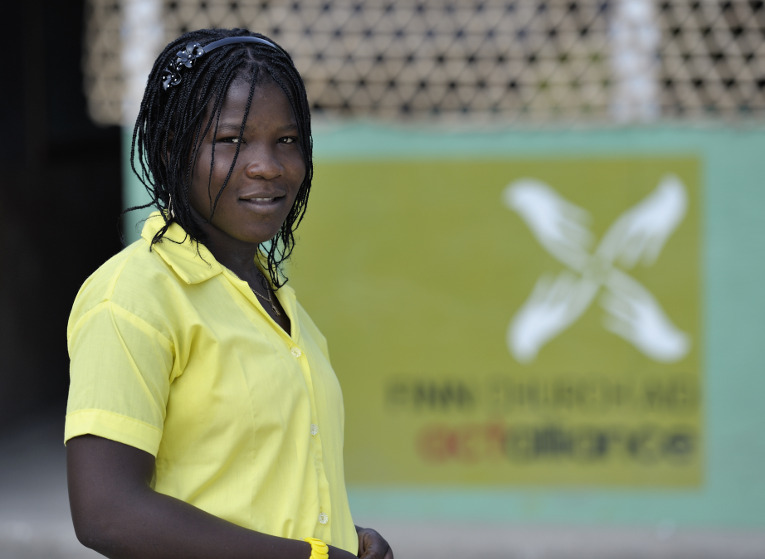
Kathia Amy, a 17-year old in Grand-Goave, Haiti, one year after the January 2010 earthquake. She is pictured here in front of her school, the College Les Freres Milord, which was rebuilt after the quake by Finn Church Aid. Photo: Paul Jeffrey.
Although the temporary school structures were rudimentary, with walls made of tarpaulin or plywood, reopening schools gave people a chance to resume, at least to certain extent, their normal, everyday lives. As children in school uniforms reappeared on the streets, Haitians got a sense that life was returning to normal.
Early on, the light structure of the schools was a positive thing, since people who had experienced the earthquake would not have felt comfortable surrounded by heavy roofs and thick walls.
Thousands returned to school
Within the first two years, more than 340 temporary classrooms were built. Construction on permanent school buildings also began soon after the earthquake.
“The 17 schools Finn Church Aid constructed, as well as the remaining six schools and one vocational school still under construction, are sustainable and modern buildings, highly appreciated by local communities”, says Uluç Baslanti, FCA Country Manager for Haiti.
All schools are earthquake-resistant and provide a safe environment for children to learn in. FCA has provided all schools with school equipment, kitchens, and water and sanitation facilities. The schools will be in use for decades.
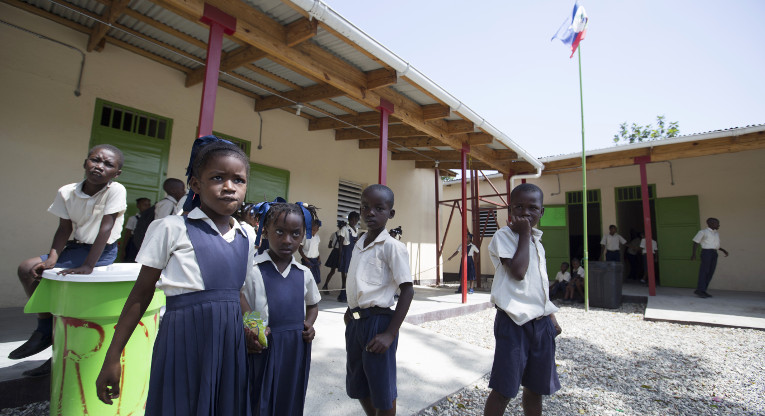
All schools are earthquake-resistant and provide a safe learning environment for children. Students at Myrdud school, Léogâne, in 2014. Photo: Minna Elo.
The temporary or permanent schools built by FCA have given 22,000 children a chance to study.
Major supporters of the school construction effort were The Inter-American Development Bank (IDB), UN Development Programme UNDP and The Primate’s World Relief and Development Fund (PWRDF).
School construction was the biggest and most visible part of FCA’s work in Haiti, but by far not the only one. One major result of FCA’s work has been encouraging communities to participate in the development of education and to weigh influence on their own situation.
Haiti
- Haiti is the poorest and least developed country on the western hemisphere. Literacy rate is at 60 percent and 12 percent of the population have access to the Internet. The need for education is extremely dire.
- Finn Church Aid is forced to end its work in Haiti this year as a result of funding cuts made to development cooperation.
- The work was extended for early 2017 to give FCA time to repair schools damaged in the hurricane and continue distributing psychosocial support and school lunch programmes in hurricane affected areas. Training was given to teachers to improve their disaster preparedness. FCA also distributed school supplies to students and teachers.
Entire communities were included in the running of schools with the foundation of school committees where school directors, teachers, students and parents all participate. Parents gained understanding on the importance of education and became more interested in participating in their children’s schoolwork.
Additional training on student-centred teaching methods, and education of teacher trainers through volunteers of the Teachers without Borders network have improved the quality of teaching and the wellbeing of students.
Through its local partners, FCA has also supported literacy training for around one thousand illiterate adults. Women’s savings groups and livelihoods have been supported through Women’s Bank. Since Haiti is a country vulnerable to natural disasters, FCA and its local partners have strengthened the disaster preparedness of local communities. This preparedness was put to the test when a strong hurricane passed through Haiti in October 2016.
Even though hurricane Matthew resulted in property loss, people involved in FCA programmes have said they are proud of what they know they have achieved. Not even a hurricane can take away the new information and new skills that make a community stronger and better prepared.
“Haiti changed everything”
The humanitarian operation following the 2010 Haiti earthquake permanently changed the direction of Finn Church Aid.
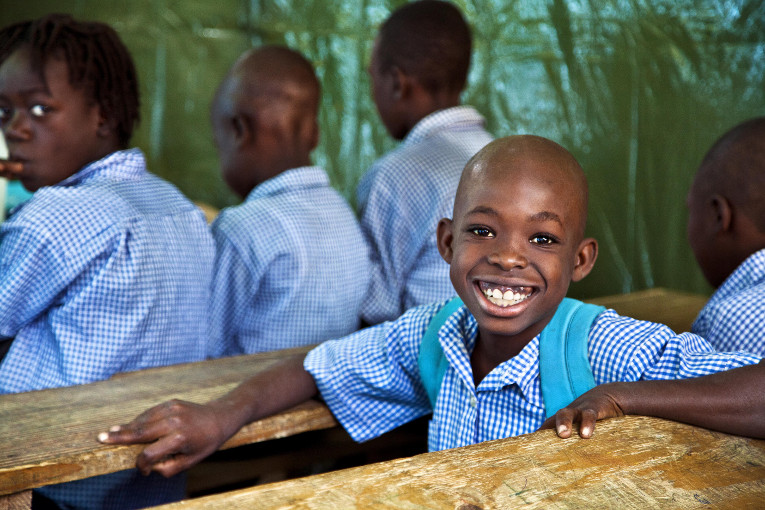
Dorrel Kensy went to first grade in St. Pierre’s tarpaulin school in 2012. He favorite subject were mathematics and science. Now there iare permenent, safe school buildings at the site. Photo: Zara Järvinen.
“FCA isn’t the same organisation it was prior to the Haiti earthquake. That event marks one of the major milestones in FCA’s history”, says Eija Alajarva, Head of Humanitarian Assistance.
In earlier natural disasters, FCA had mainly assisted emergency efforts by funding local NGOs, like other members of the ACT Alliance, a coalition of church-affiliated humanitarian organisations. In Haiti, the magnitude of devastation meant that education specialists like FCA were gravely needed.
“Haiti has been a successful operation for FCA, but we learned many things the hard way, since there was no time to develop and test things in practice before implementing them on the field.”
Since Haiti, FCA has purposefully developed its readiness to assist in major natural disasters. The lessons learned were put to use in 2013 when typhoon Haiyan bruised the Philippines, and in 2015 when Nepal was struck by an earthquake.
“We are continuously developing our operation in order to offer the best possible response when a disaster strikes. Without Haiti we would be a very different organisation.”
Text: Ulla Kärki and Noora Jussila
This year and next year, Finn Church Aid (FCA) constructs more transitional and semi-permanent learning centres with adequate water, sanitation and hygiene facilities in Nepal, extends its post-earthquake teacher training to new schools, and continues psychosocial support for teachers and children.
Devastating earthquakes hit Nepal on 24 April and 12 May 2015, destroying 770,000 homes, killing thousands and affecting millions. Four thousand schools were destroyed or damaged, keeping 1.2 million children out of classrooms.
After providing emergency relief, Finn Church Aid decided to concentrate its efforts on making it possible for children and youth to continue their studies. Within a couple of months after the earthquake, FCA had constructed temporary learning centres for nearly 20,000 students.
In 2016-2017, FCA builds 600 transitional classrooms in the districts of Makwanpur, Gorkha and Sindul with funding from UNICEF.
In remote areas of the Lalitpur district, FCA builds 40 semi-permanent (lifespan of 15-20 years) classrooms for schools which were not included in the reconstruction scheme of the Ministry of Education. FCA will also repair partially damaged, but structurally safe school buildings and tear down unsafe ones.
With the National Center for Education Development, Finn Church Aid is developing an activity package aiming to strengthen the cooperation between schools, families and communities in tackling post disaster child protection risks in Nepal. FCA is also cooperating with four secondary schools to develop an emergency school material kit especially aimed at high school-age students.
“FCA is bridging the gap between response and reconstruction to strengthen the overall quality of education, resilience and recovery at school and community level. The collective efforts of the government and NGOs fulfilled only 70 per cent of the need for temporary learning centres. Therefore, FCA continues to build additional transitional and semi-permanent learning centres”, says Finn Church Aid Nepal Country Manager Lila Bashyal.
Finn Church Aid extends its teacher training for post-earthquake recovery to new schools. The training is given in cooperation with Nepalese education authorities and gives teachers and pupils tools to manage their anxiety and identify when peer support is not enough and professional help is needed.
“FCA continues to provide psychosocial support, because even after one year of the massive earthquake, due to continued aftershocks, teachers report that earthquake survivor children are still traumatised with high levels of psychological and academic distress”, Mr Bashyal says.
The situation in the country remains severe, as people are still waiting for government support for rebuilding their homes and starting their livelihoods. Hundreds of thousands of Nepalese, who lost their homes in the earthquakes, are still living in temporary sheet metal shelters, and even in tents.
Further information:
Lila Bashyal, FCA Country Manager for Nepal, email: lila.bashyal(at)kua.fi, Tel. +977 98 511 59 106
Merja Färm, Humanitarian Coordinator, email: merja.farm(at)kua.fi, Tel. +977 98101 35798







